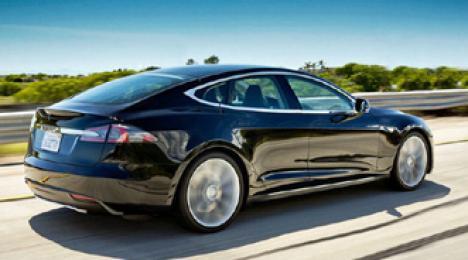Teslas Begin Entering the Used Market

Tesla Model S
By subscribing, you agree to receive communications from Auto Remarketing and our partners in accordance with our Privacy Policy. We may share your information with select partners and sponsors who may contact you about their products and services. You may unsubscribe at any time.
ATLANTA –
With the help of a hefty loan from the Department of Energy in 2009, Tesla Motors has survived infancy, and is becoming more and more popular, as it expands its lineup and plans to offer a more affordable option for consumers in the near future.
The company has now been around long enough to start making a splash on the remarketing side of the industry, though the amount of Teslas entering the used market remains low.
For example, earlier this month, online auto retailer Carvana announced that what it’s calling the first Carvana certified pre-owned Tesla is now available on its website.
And Tesla postings on AutoTrader.com are showing significant boosts in shopper interest this spring. Auto Remarketing gained some insight into how these used vehicles are performing on the site from Mark Strand, industry intelligence manager at AutoTrader.com.
If you don’t think Tesla is making waves among car shoppers, check out this statistic.
Last month, Tesla models showed 929 percent more interest per listing than other vehicles in their competitive set on AutoTrader.com.
Subscribe to Auto Remarketing to stay informed and stay ahead.
By subscribing, you agree to receive communications from Auto Remarketing and our partners in accordance with our Privacy Policy. We may share your information with select partners and sponsors who may contact you about their products and services. You may unsubscribe at any time.
That said, “As the number of listings for used Tesla models on our site increases, the interest level will naturally become more consistent with other vehicles in the competitive set,” Strand added.
With that in mind, due to the increasing number of Tesla listings, AutoTrader is seeing a decline in the number of views per listing, he explained.
“However, this does not mean that interest is necessarily waning. As of right now, people interested in searching for used Teslas have fewer listings to view, so the percent of views per listing is naturally higher,” he said. “As more listings are posted on the site by dealers and private sellers, the percentage of views per listing will normalize.”
Interest in the luxury vehicles is still growing, though, and AutoTrader anticipated the difference in interest per listing to remain high for the foreseeable future.
And though the Tesla units still account for less than 1 percent of their competitive group on the site, the number of used Teslas listed on AutoTrader.com has grown by 820 percent.
But since the pre-owned market penetration remains low, Strand says, “They are unlikely to have a significant impact on the used market at their current level, and it will likely be several years before that could change.”
But there is no denying the number of used Teslas entering the market is growing. And this brings up the following question: Will dealers seek them out for their lots?
This poses an interesting point as franchised and independent dealers alike have been rallying against the automaker in opposition to its direct-to-consumer sales model, with lawsuits popping up all over the country in early 2014.
Stand says this shouldn’t have any impact on whether dealers intend to sell used Teslas.
“I think dealers will be able to keep any feelings around the Tesla direct sales model separate when looking at the profit opportunity a used Tesla could present. If the opportunities are there, I think dealers will be open to them, especially independent dealers who specialize in high-end luxury and exotics,” said Strand.
But it is too early to know much about Tesla retention rates and whether they will prove to be a good investment for dealers’ used departments.
“It’s early to draw definitive conclusions at this point. However, given the restrained supply and rave reviews the car gets, dealing in a good quality used Tesla seems like a solid opportunity for a dealer who is experienced in handling exotics and high end niche vehicles,” Strand said.
Market trends such as supply and demand are at work here, too. “In the short term, limited supply should keep used values on Teslas relatively high,” Strand said.
“But further down the road, as production capacity expands and the buzz dies down, I would expect used Teslas to lose some of their premium. From the consumer perspective, if someone is in the market for a Tesla, I don’t think he or she will be focused foremost on value retention and investment, as that person likely has some cash to burn,” he continued. “Even with strong value retention in the short term, we don’t know enough about how these cars age to know what the investment/depreciation will look like five to 10 years out, with high mileage or when the batteries near end of life.”
Much is still unknown about Tesla’s potential impact on the used-car industry, but the numbers are growing at a rapid pace — only time will tell what long-term effects the automaker will have on the EV and remarketing industries.


